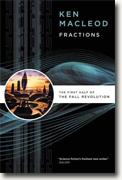Fractions
Ken MacLeod
book reviews:
· general fiction
· chick lit/romance
· sci-fi/fantasy
· graphic novels
· nonfiction
· audio books
· author interviews
· children's books @
curledupkids.com
· DVD reviews @
curledupdvd.com
newsletter
win books
buy online
links
home
for authors
& publishers
for reviewers

 |
Fractions: The First Half of The Fall Revolution Ken MacLeod Orb Paperback 640 pages October 2008 |
|
Given the almost universal praise directed toward Ken MacLeod as a powerful voice in sci-fi, I feel I must justify my opinions on this book before proceeding, so first some background on the author: MacLeod brings a level of seriousness to sci-fi that is sometimes lacking. Not that today’s sci-fi is excessively whimsical (quite the opposite—it seems to be more serious and ambitious than ever), just that it rarely measures up to the intensity of MacLeod’s politically- and culturally-driven thrillers. In all of MacLeod’s novels—particularly The Star Fraction and The Stone Canal, the two novels reprinted in this collection—a wild and thorough imagination is put to use investigating weighty questions of social dissolution and historical trends’ impact on the future. His quick-witted work feels—in the best of ways––like an at-times caustic analysis of our times from a real history geek, in a much more sincere and scholarly manner than sci-fi is used to presenting.
The Star Fraction is the guiltier of the two novels. In a politically fractured future where conspiracies and crime syndicates are the only thing close to major world powers, individuals must fight against information technology and extreme paranoia to navigate their brave new world. Think if Philip K. Dick were writing today, but in a post-American-hegemony age. The multiple story arcs are a complex puzzle to unravel, accentuated by MacLeod’s frequent subject changing and jilted language that are unnecessarily clipped: But that was only a potential, an aching longing, as long as the reality of space development was turned against itself, literally turned inwards, by Space Defense. The US/UN held that high ground, cynically supervising the planet’s broken blocs. The Peace Process: divide-and-rule replicating downwards in a fractal balkanization of the world.Note the words missing around the commas that would smooth the transition from clause to clause. The excessive use of commas breaking up complete thoughts. The colon usage in “The Peace Process” that makes it sound more like a report title than a sentence. This may sound like nitpicking, but try slogging through 300 pages of it and see how far you’re willing to take prose that fights against you. MacLeod’s writing is stylish and matches the tone of his novels, but his ambition backfires, rendering his characters wooden and his plots deadened. His interesting reading is undone by his clumsy––and thus uninteresting––writing. The Stone Canal fares better, combining a more cohesive plot with more rounded characters, though I suspect this is only so because MacLeod was forced to devote attention to his characters since a major theme of the novel is the humanity of machines. Farther in the future and less tied to the contemporary political scenario, the society of New Mars must contend with touchy man-machine relations (with politics that make Battlestar Galactica’s Human-Cylon drama look simplistic) and implanted suites of computer applications designed to segment and enhance human processing. MacLeod’s creativity feels more free-flowing in this novel, intelligent but unbound by History Channel geek conventions. Personality-clone machines are introspective and almost tenderly human: “‘Our task?’ Wilde almost shouted. ‘What do you mean “our”? The way I see it, I’m not Jon Wilde. I have his memories, and my body is like his at twenty.’” But for every gem of surprising depth, there’s a groan-worthy counterbalance of clumsiness, such as this sex scene: “I tried for a moment to think of some reply, and then put my tongue to a better use.” If you’re willing to put up with writing that would be called dry if it weren’t trying to be so edgy, MacLeod’s intelligence and vision are unparalleled. But those looking for a novel that isn’t actively repelling their engagement may wish to look elsewhere. Sci-fi shouldn’t just be easy-going escapism, but it shouldn’t be stuffy either. Detailed hard thinking isn’t an excuse for poor supporting writing. Originally published on Curled Up With A Good Book at www.curledup.com. © Max Falkowitz, 2009 |
| Also by Ken MacLeod: |
|
|
|
 Click here to learn more about this month's sponsor! |
|
| fiction · sf/f · comic books · nonfiction · audio newsletter · free book contest · buy books online review index · links · · authors & publishers reviewers |
|
| site by ELBO Computing Resources, Inc. | |
 Given what MacLeod is trying to accomplish, it should be expected that his books can be challenging reads. After all, if they weren’t, they wouldn’t be doing their job. But there are challenges worth the effort and challenges that aren’t; MacLeod teeters on that edge. Terse and unforgiving, the prose of The Star Fraction and The Stone Canal hinder one’s understanding of their themes and narratives as much as help. While MacLeod is interested in presenting a story deliberately fractured and slow-going, he risks losing readers in the process. And if we’re spending too much time playing catch-up, we aren’t engaged and aren’t paying attention.
Given what MacLeod is trying to accomplish, it should be expected that his books can be challenging reads. After all, if they weren’t, they wouldn’t be doing their job. But there are challenges worth the effort and challenges that aren’t; MacLeod teeters on that edge. Terse and unforgiving, the prose of The Star Fraction and The Stone Canal hinder one’s understanding of their themes and narratives as much as help. While MacLeod is interested in presenting a story deliberately fractured and slow-going, he risks losing readers in the process. And if we’re spending too much time playing catch-up, we aren’t engaged and aren’t paying attention.